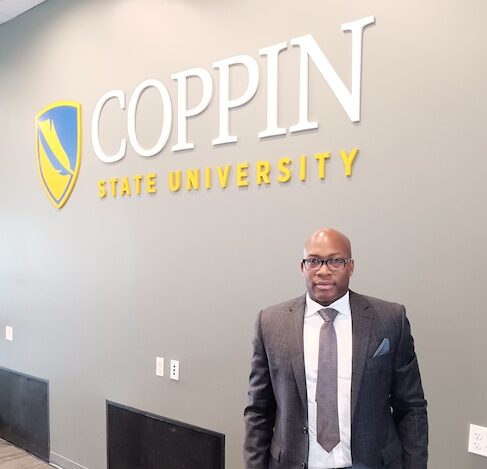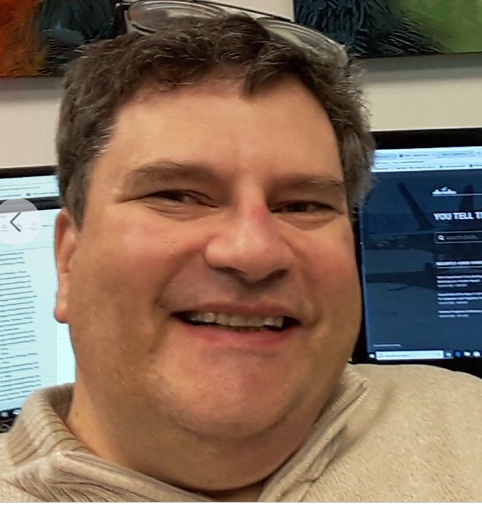Coppin State University and the U.S. Department of Commerce on Monday unveiled a new federally funded program that aims to help bridge the digital divide in the Coppin Heights, Mondawmin and Walbrook neighborhoods surrounding the historically Black college’s (HBCU) West Baltimore campus.
The ConnectEagle Nation program is supported by a $3.9 million federal grant that will assist in the distribution of 2,000 laptops, as well as workforce development resources, in the aforementioned communities. The elected representatives that gathered in Coppin State’s Tawes Center for the Monday announcement — including Maryland’s new governor Wes Moore and Senators Chris Van Hollen and Ben Cardin — said they saw the grant as an opportunity to help bridge the digital divide in Baltimore. That divide is part of a larger issue in Maryland, in which nearly 40% of the state’s Black residents (who make up the majority of Baltimore, and nearly the entirety of historically redlined West Baltimore) lack high-speed wireline internet at home.
But the current grant offers the impacted neighborhoods no provision for private or public Wifi connections.
“No routers or Wifi, but laptops,” said Kevin Hughes, acting director of the National Telecommunications and Information Administration’s (NTIA) Office of Minority and Broadband Initiatives. “And they might be Wifi enabled.”
The Coppin State program is funded through the larger Connecting Minority Communities Pilot Program, described by the NTIA as a $268 million grant program to HBCUs, tribal colleges and universities and so-called minority-serving institutions. According to its website, the program supports “the purchase of broadband internet access service and eligible equipment, or to hire and train information technology personnel.”
The Commerce Department announced during the Coppin State event that over $30 million more would soon go to another dozen HBCUs around the country. As for the initial 2,000 devices, they are expected to be distributed based on residents’ income.

Nicholas Eugene. (Courtesy photo)
Nicholas Eugene, an associate professor in Coppin State’s mathematics department, was the primary investigator who helped assemble the university’s grant application. He noted that the university did a needs assessment for the adjacent communities as part of that process.
While he also acknowledged the lack of support for public Wifi access, Eugene thinks that the program’s work still provides significant value.
“What we found out is that people need access to a computer,” he said. “They need access to broadband. Part of the funding is to support those efforts to give members of the community computers, computer certifications to get into the workforce.”
Eugene added that the university will eventually partner with Enoch Pratt Free Library to do outreach about other federal opportunities.
Deputy Secretary of Commerce Don Graves told those gathered that the overriding project would bring affordable high-speed internet to everyone in America.
“Our ‘Internet For All’ Initiative is going to create unbelievable opportunities,” he said. “It’s not just hyperbole.”
The parties behind the program will work with NPower, whose vice president of partnership development Kendra Parlock said it serves 18-26-year-olds from underresourced communities and veterans — with a special focus on women of color. Its goal is economic mobility through technology, which, through the university’s grant, allows NPower to train 20 people during each of the next two years as digital navigators. Digital navigators can help residents understand how to use digital technology and the internet. Once the program is completed, the trainees will have the opportunity to get certification in an associated field.
“We will be leading the training for digital navigators and offering the opportunity for certification in IT and cybersecurity,” she said of NPower’s participation. “We will work to put [trainees] in tech jobs upon graduation for the program.”
Join our growing Slack community
Join 5,000 tech professionals and entrepreneurs in our community Slack today!
Donate to the Journalism Fund
Your support powers our independent journalism. Unlike most business-media outlets, we don’t have a paywall. Instead, we count on your personal and organizational contributions.

Maryland firms score $5M to manufacture everything from soup to nanofiber

National AI safety group and CHIPS for America at risk with latest Trump administration firings

How women can succeed in male-dominated trades like robotics, according to one worker who’s done it


